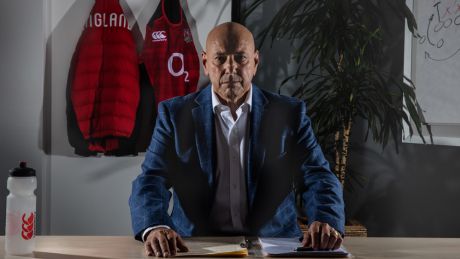Claude Littner On How To Interview Someone For A Job
The Apprentice’s fearsome interrogator on how to find out if someone is really right for a job

You’ve been interviewed for a job, haven’t you? You’ve also read and been given plenty of advice on how to nail a job interview: dress smartly, research the role, rehearse, have a set of humblebrag weaknesses at the ready and, for the love of all that’s holy, be on time.
But as your career progresses and you shimmy up the greasy pole you may find yourself on the other side of the table. Yet rarely does anyone get advice or training on how to run an interview process – you’re just thrown in the deep end and expected to come up for air with the perfect candidate.
So when we we were offered the chance to speak to Claude Littner – perhaps best known as one of Alan Sugar’s attack dogs on The Apprentice, but a successful businessman in his own right – we jumped at the chance to get some advice from the man who’s done countless interviews, including grilling England rugby players on behalf of sponsor Canterbury.
Fear not, we’re not recommending you’ll be as combative as Littner here – that’s only for Jedi-level interviewers. The advice we got is more useful. Here’s what we learned, in Littner’s own words.
It’s worth reminding yourself of the point of the exercise
“The whole purpose of an interview and a good interviewer is to extract as much information as possible from the interviewee – to a certain extent to put that person at ease, although when you watch The Apprentice that’s not what I do. That’s what will give you the best possible chance of selecting the right candidate for the job.
“But it’s a two-way process. The interviewee should be trying to find out if he or she is the appropriate candidate, if the chemistry and culture works, and what it will be like to work for the company so when both parties actually enter into the agreement they know what to expect.”
Because there is no magic formula to conducting an interview
“There is no one set rule. There’s no, ‘This is the first question you ask, this is the second question’ – it has to flow and the whole point is to make sure that both parties have a clear understanding of what is required and that they both engage openly. There should be as few surprises as possible once the candidate gets appointed and starts the job.”
Sign up for workout ideas, training advice, reviews of the latest gear and more.
“Some people are very happy to talk and have got great confidence about them. Those people I might allow to just talk, up to a point, so I can get information. Some people are a little bit shy or reticent at the beginning so it’s incumbent upon me to start talking, start explaining things and try to put them at their ease and extract information from them.”
You’ll learn how to interview by interviewing
“I’ve never had anyone who sat me down and said ‘This is the way one does an interview’. I recall on more than one occasion I perhaps haven’t handled an interview as well as I could in terms of extracting information from the interviewee, but as time goes on I think you learn some tricks and become a lot more professional at doing it.”
Take the time to prepare, but base your decision on the interview proper
“When I see the candidate I will have spent quite a lot of time looking at the CV so I’ve got a pretty good understanding of it. I’ll also have read about them on social media, or got the accounts of their company.
“But for me the most telling thing is to get the individual in front of me and start talking to the person. When the CVs come to me people [in HR] have determined that these individuals have the capability to do the job, so for me it’s to make sure they’re not going to give me a lot of trouble because, say, they have a completely different mindset or objective as to where they see the company going.”
And keep it one-to-one
“If I’m interviewing somebody, I want to be the sole interviewer. I want to have a one-to-one with the person who’s come for the job. There are some companies where you have a panel of interviewers but I think that’s something that could put extra stress on the interviewee.”
Canterbury is the official kit partner of England Rugby

Jonathan Shannon was the editor of the Coach website from 2016 to 2024, developing a wide-ranging experience of health and fitness. Jonathan took up running while editing Coach and used the training plans on the site to run a sub-40min 10K, 1hr 28min half marathon and 3hr 6min marathon. He’s an advocate of cycling to work and is Coach’s e-bike reviewer, and not just because he lives up a bit of a hill. He also reviews fitness trackers and other workout gear.
